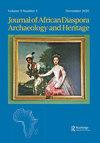铁宇宙论、奴隶制和社会控制:巴西东南部Paraíba山谷咖啡种植园叛乱的物质性
Q1 Arts and Humanities
Journal of African Diaspora Archaeology and Heritage
Pub Date : 2016-05-03
DOI:10.1080/21619441.2016.1204794
引用次数: 8
摘要
在巴西东南部Paraíba山谷的两个咖啡种植园的奴隶宿舍进行的考古研究显示,与糖种植园地区奴隶宿舍的物质丰富形成鲜明对比的是物质匮乏。在本文中,我们首先讨论了这些差异的原因,认为它们与对奴役食物方式的严格控制有关。尽管这种控制可能抑制了非洲文化习俗的一个重要特征,但我们认为,这些群体采用了其他物质资源,这些资源表达了中非社会广泛共享的价值观,其中大多数人来自中非社会。这些物品很可能让人回想起中非关于铁的作用和与铁匠有关的超自然力量的普遍宇宙观。在最后一部分,我们将讨论这些信仰体系在该地区兴起的奴隶起义中所起的关键作用。本文章由计算机程序翻译,如有差异,请以英文原文为准。
Iron Cosmology, Slavery, and Social Control: The Materiality of Rebellion in the Coffee Plantations of the Paraíba Valley, Southeastern Brazil
Archaeological research carried out in the slave quarters of two coffee plantations in the Paraíba Valley, Southeastern Brazil, revealed a material scarcity that is highly contrastive with the material abundance found on slave quarters in sugar plantation regions. In this article, we first discuss the reasons for these differences, arguing that they are related to a tight control over the enslaved foodways. Although this control could have suppressed an important feature of the African cultural practices, we argue that these groups adopted other material resources that expressed values widely shared among the Central African societies from which most of them came. These items very likely recalled a general Central African cosmology regarding the role of iron and beliefs in supernatural powers associated with blacksmiths. In the final section, we discuss the crucial role that these belief systems played in the slave rebellions that arose in this region.
求助全文
通过发布文献求助,成功后即可免费获取论文全文。
去求助
来源期刊

Journal of African Diaspora Archaeology and Heritage
Arts and Humanities-History
CiteScore
0.80
自引率
0.00%
发文量
9
期刊介绍:
Journal of African Diaspora Archaeology and Heritage provides a focal point for peer-reviewed publications in interdisciplinary studies in archaeology, history, material culture, and heritage dynamics concerning African descendant populations and cultures across the globe. The Journal invites articles on broad topics, including the historical processes of culture, economics, gender, power, and racialization operating within and upon African descendant communities. We seek to engage scholarly, professional, and community perspectives on the social dynamics and historical legacies of African descendant cultures and communities worldwide. The Journal publishes research articles and essays that review developments in these interdisciplinary fields.
 求助内容:
求助内容: 应助结果提醒方式:
应助结果提醒方式:


